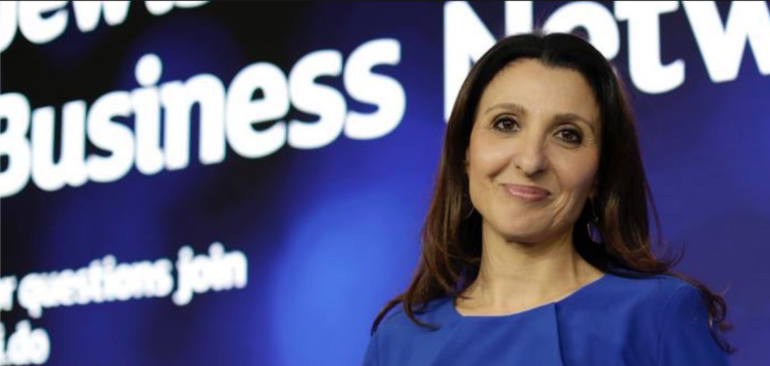
Jerusalem’s Deputy Mayor Is An Orthodox Jewish Woman
The honorable deputy mayor of Jerusalem, Fleur Hassan-Nahoum has a deep personal history with observance and politics. Originally from Gibraltar, the British Protectorate at the southern tip of Spain, she grew up in a traditional Sephardic community. The daughter of a Spanish father and a Moroccan mother, she attended Hebrew school and had classes with a rabbi in public high school. The Jews moved to Gibraltar when the British took over; they were the first settlers there. “My father was the first prime minister of Gibraltar, and he was elected eight times. He was a Jew who was outspoken, and very honest about his Judaism. [A Jew who] went to shul every week and had a kosher home was basically the head of the country for about 40 years.”
Because of her Jewish education, she ended up becoming more religious than her parents. “My parents were always very supportive of that, and any changes that I needed to make at home.” She married someone even more observant than her, who wanted to create a home in Israel and made aliyah before their four children were born. “Baruch Hashem, and we’ve been here for 19 years.”
Hassan-Nahoum says, “Because I grew up in a political home, politics [were] not alien to me….people are scared of politics, a lot of women think ‘oh no it’s not for me, it’s too rough.’ It probably is too rough, but I grew up with it.” Her father’s involvement was a very positive influence. “I saw how people loved him because he did so much for people, so I always had that in the back of my mind. People who are politicians are always politicians, since the day they were born. I was the class rep [at] twelve, the student body president [at] 18, the head of the Jewish society in college, so I’ve always had a record of being able to step up and help when I was needed.”
A lawyer by profession, Hassan-Nahoum studied in England, worked in Jewish non-profit for several years and became the executive director of Tikvah before creating a communications consultancy, helping people to present their stories more effectively. “In the course of my work, I was asked to help a small political party and I got sucked in.” She became a city councilwoman in 2016, ran again in 2018 and was made a deputy mayor for foreign relations. “Nothing happens coincidentally…God opened a door in 2013, and I felt that I had to walk through it.”
Hassan-Nahoum is responsible for Jerusalem’s diplomatic relations: from the new United States Embassy, to economic development with different countries, to philanthropy and tourism coming into the city. “Anything to do with Jerusalem’s image, its connections and its commercial and diplomatic ties abroad.” With the current world climate, it is easy to feel like politics is a zero-sum game, and that there is no way to win any political argument. “I don’t believe in that and I don’t believe that Judaism believes in that, because we have a tradition of interpretation, of halacha, of multi-opinions, of seventy faces to the Torah, and that’s what it’s supposed to teach us.”
Social media has changed the political landscape. “Our communications culture is setting the scene for the polarization of society. Instead of bringing us closer together, [it does the opposite.]” Even news coverage only shows one aspect of things. “What the world doesn’t see is all the collaboration there is between politicians of different parts of the political spectrum. Even though I’m a right-wing Likud member of the central committee… some of my very good friends in politics come from the left, [or] come from the Haredi society. You wouldn’t necessarily think the would have anything to do with a feminist woman, even an Orthodox feminist woman.” While there are some politicians who are just out for their own gain, “Behind the headlines, there’s a lot of good faith and collaboration and very good people.”
A decisive moment for Hassan-Nahoum was the day two years ago that the U.S. Embassy moved from Tel Aviv to Jerusalem. “The fact that Israel can decide actually where its own capital is was absolutely momentous. After the U.S., Guatemala came, we’ve had Honduras on its way with the trade-off and Australia and I think it started a domino effect which is only going to be good for the entire region, not just Israel, not just the Jewish population, but everybody.”
Hassan-Nahoum is far from the only religious woman in Israeli politics. “25% of the Knesset is women, in local politics its a little less. I won’t be happy until women are 50% of the decision-makers, because only then will we have a balanced world.” She is passionate to make a voice for Ultra-Orthodox women in Israel. In terms of her observance, “I try to explain to [others] the religious values that I try to live by, which is respect for every human being, the values of family, giving, kindness, of being able to read, learn and understand Torah yourself.” This is epitomized with the key to all three of her roles: “The most important element of being a religious woman, of being a politician and being a mother of four children, is having Shabbat as my stop-gap in the week, reflection, getting back to our place in the world, our priorities and I tell people who are not observant, ‘you don’t know what you’re missing by not keeping Shabbat.'” She recommends this tried and true method for electronic cleansing. “It’s the one day I can disconnect from my phone…we can play a real game. We can eat with family [and] community. Shabbat keeps me sane and my batteries recharge.”
While she would love to look to national politics eventually, for now she is working hard at her current role. “As long as I can serve my people and my country, then I’ll be happy to continue.” Just like the Jewish people in their capital, she is proud to continue to build.
If you found this content meaningful and want to help further our mission through our Keter, Makom, and Tikun branches, please consider becoming a Change Maker today.







